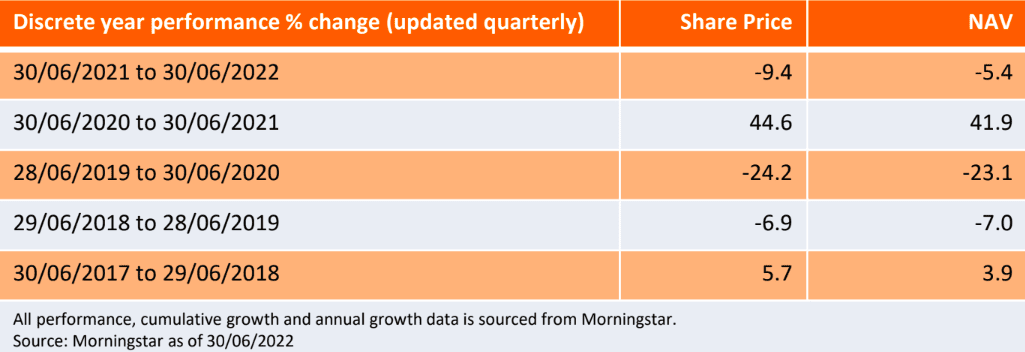Subscribe
Sign up for timely perspectives delivered to your inbox.

Laura Foll and James Henderson, Portfolio Managers of Lowland Investment Company, deliver an update on the Trust, highlighting factors currently impacting the UK market, key drivers of performance, and recent portfolio activity over the month.
June was a very poor month for the UK equity market with the FTSE All-Share Index declining 6.0%. Continuing the trend seen so far this year, small and medium-sized company share prices underperformed, with the FTSE 250 Index falling 8.3% and the micro-cap FTSE AIM All-Share Index falling 10.0% (figures are total return and in sterling terms).¹ This market decline came about due to the growing assumption that in order to bring down stubbornly high levels of inflation central banks will potentially need to raise interest rates to the extent that they will trigger a recession. The current market fall that we are seeing is; therefore, the market attempting to price in future earnings declines, particularly in more cyclical areas of the market such as consumer discretionary, where we have seen among the highest share price falls.
Within the context of a steep market decline, the Trust returned -6.8% and underperformed its FTSE All-Share Index benchmark which returned 6.0%. The AIC UK Equity Income peer group returned -5.2%.¹
The largest individual detractor from performance was retailer Halfords, which guided to lower-than-expected earnings for the year ahead as consumer spending in more discretionary areas (such as bikes) slowed. We added to the position following the share price fall as we thin k the business has improved in quality in recent years (for example, it has a stronger balance sheet and a greater focus on service sales), while the valuation (if current earnings forecasts are held) was lower than its historic average. Among the best performers in June was Euromoney Institutional Investor, which received a takeover approach from private equity.
During the month, our trading activity was largely focused on gradually switching out of companies that have performed well and are trading on high valuations versus history (such as Severn Trent) into companies where share prices have been weak and in our view valuations are already (to an extent) reflecting an earnings retrenchment (such as textile rental company Johnson Service Group and baked goods producer Finsbury Food).
The current widespread assumption in the market is that the valuation compression we have seen in the first half of the year is the prelude before widespread and material earnings declines as global economic growth slows. However, what we are hearing from companies so far, with the exception of discretionary ‘big ticket’ item spend, is that demand is remaining largely resilient. Looking ahead to the second half of the year, we think the likelihood is that there may be areas that remain resilient -for example, there are pockets of consumers that built up substantial excess savings during the pandemic, and therefore have the capability to continue spending -and there could also be areas of weakness that will potentially see earnings declines.

1 Source: Bloomberg as at 30 June 2022
Balance Sheet – A financial statement that summarises a company’s assets, liabilities and shareholders’ equity at a particular point in time. Each segment gives investors an idea as to what the company owns and owes, as well as the amount invested by shareholders. It is called a balance sheet because of the accounting equation: assets = liabilities + shareholders’ equity.
Cyclical stocks – Companies that sell discretionary consumer items, such as cars, or industries highly sensitive to changes in the economy, such as miners. The prices of equities and bonds issued by cyclical companies tend to be strongly affected by ups and downs in the overall economy, when compared to non-cyclical companies.
Inflation – The rate at which the prices of goods and services are rising in an economy. The CPI and RPI are two common measures.
Recession – A recession is a macroeconomic term that refers to a significant decline in general economic activity in a designated region.It had been typically recognised as two consecutive quarters of economic decline, as reflected by GDP in conjunction with monthly indicators such as a rise in unemployment.
Valuation metrics – Metrics used to gauge a company’s performance, financial health, and expectations for future earnings eg, price to earnings (P/E) ratio and return on equity (ROE).